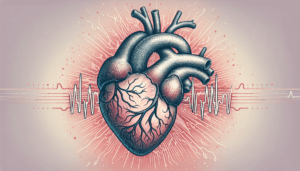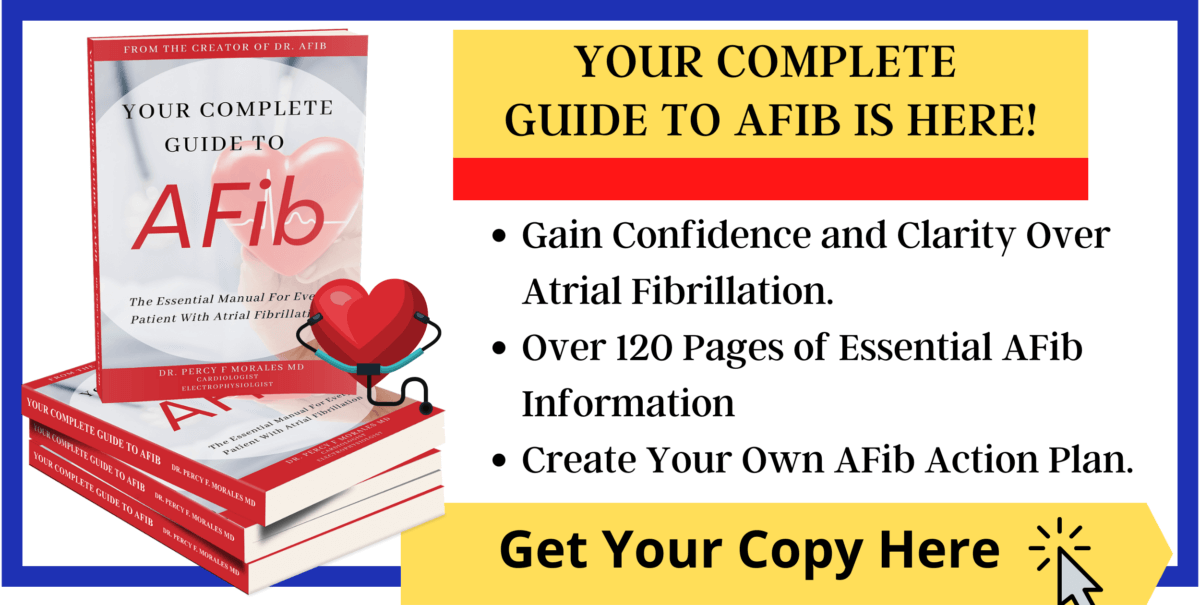Can AFib Cause Syncope?
Can atrial fibrillation cause syncope? The answer to that is, YES! I’ve seen three different ways in which atrial fibrillation can make a patient pass out.
What Causes Syncope Due to Atrial Fibrillation?
One way that atrial fibrillation can make you pass out is if your heart rate is going too fast.
Your heart rate can be going 170, 180, sometimes even faster, and it can cause poor circulation to your brain and cause a patient to pass out. Typically, this is actually the least common way that I have seen atrial fibrillation make someone pass out. A lot of people feel terrible when their heart is going extremely fast, 170, 180, even close to 200. They feel terrible, short of breath, dizzy, chest pain, but they typically do not pass out.
Most of the times when I’ve seen somebody actually pass out purely because the heart is going too fast, these patients are typically older patients who have other existing heart or vascular conditions. For example, a patient may also have a bad heart valve or have blockages in the arteries of the neck called carotid artery disease. In those types of patients it is possible that you could pass out just purely because your heart rate is going too fast.
A more common reason for passing out from atrial fibrillation is because the heart rate is going too slow.
Now, you may say, “Well, atrial fibrillation makes your heart go fast. How can it also go too slow?” Well, there’s a couple of ways in which it can go slow, one of which is that the ventricle could pause. Now in atrial fibrillation, the upper chambers of your heart or the atrium are going very fast. They are going over 300 to 600 beats per minute, but the pulse comes from the ventricle, the lower chamber of the heart. The ventricle sometimes can slow down or even pause, even despite the fact you’re in atrial fibrillation. I tell my patients, “It’s like your heart needs to just catch its breath for a second from being constantly sent signals from the atrial fibrillation.” So, the heart rate may pause, your pulse may pause for anywhere from three to five seconds, sometimes longer, and that can certainly make people get dizzy, lightheaded, or even pass out.
The third way in which you can pass out is actually not because of atrial fibrillation, but because atrial fibrillation stops.
This is called a conversion pause. In this example, if a patient has episodes of AFib that come and go, but when the AFib actually stops, your natural heartbeat may take several seconds to start kicking in. It’s like your natural heartbeat is just also just so tired from being in atrial fibrillation, it takes several seconds for it to start kicking in again, and start having a natural heartbeat. This can lead to pauses that can last three, four, five seconds, sometimes longer, before the natural heartbeat starts kicking in again. This is the most common reason that I have seen people passing out from atrial fibrillation, its this actual pauses that happen when the AFib stops, and your natural heartbeats is too slow to kick back in again.
How Is AFib Related Syncope Diagnosed?
The hardest part about diagnosing the cause of syncope related to atrial fibrillation is actually catching an episode on a heart monitor. Episodes of syncope can be unpredictable. Sometimes patients may go several months in between episodes of fainting. Many times a patient may wear an external heart monitor for 14 days. If during this monitor there were no episodes of fainting the monitor will appear fairly normal. In general, the longer a patient wear an external heart monitor, the higher the chance of catching an episode of fainting. In addition, there are also options for internal cardiac monitors. These are very small recorders call loop recorders that go under the skin and can record a persons heartbeat for up to 3 years if needed. Read more about implantable loop recorders here.
How Do I Stop Syncope Episodes?
So how can you treat these situations and hopefully prevent a patient from passing out? What can you do for the times that a patient passes out because the heart rate is too slow? Well, the first step, adjusting medications, is sometimes an option, and it’s typically one of the first steps that I do. However, I’ve emphasized in other posts that whether a patient with atrial fibrillation is treated with medications or ablation procedures, nothing is a 100% cure for atrial fibrillation. Passing out is so serious that for my patients, if someone passes out, and there’s some documentation of a very slow heart rate or pauses, I typically end up recommending a pacemaker. A pacemaker will stop these very slow heart rate episodes and will prevent passing out.
There are a few exceptions where I may be willing to try medications or even ablation procedures to see if that can help prevent the passing out. So, if you’ve had a history of passing out in the past, please discuss with your doctor, what may be the reasons why you passed out, especially if you have a history of atrial fibrillation, and discuss with them what may be your best treatment options.
The Best Atrial Fibrillation Book
Your Complete Guide To AFib: The Essential Manual For Every Patient With Atrial Fibrillation

Shop AFib Products on Amazon
KardiaMobile 6-Lead Personal EKG Monitor – Six Views of The Heart – Detects AFib and Irregular Arrhythmias – Instant Results in 30 Seconds – Works with Most Smartphones - FSA/HSA Eligible
13% Off
KardiaMobile 1-Lead Personal EKG Monitor – Record EKGs at Home – Detects AFib and Irregular Arrhythmias – Instant Results in 30 Seconds – Easy to Use – Works with Most Smartphones - FSA/HSA Eligible
$79.00 (as of June 5, 2025 06:30 GMT -06:00 - More infoProduct prices and availability are accurate as of the date/time indicated and are subject to change. Any price and availability information displayed on [relevant Amazon Site(s), as applicable] at the time of purchase will apply to the purchase of this product.)
Apple Watch Series 9 [GPS 41mm] Smartwatch with Storm Blue Aluminum Case with Silver Sport Band M/L. Fitness Tracker, Blood Oxygen & ECG Apps, Always-On Retina Display
(as of June 5, 2025 07:43 GMT -06:00 - More infoProduct prices and availability are accurate as of the date/time indicated and are subject to change. Any price and availability information displayed on [relevant Amazon Site(s), as applicable] at the time of purchase will apply to the purchase of this product.)
Fitbit Sense 2 Advanced Health and Fitness Smartwatch with Tools to Manage Stress and Sleep, ECG App, SpO2, 24/7 Heart Rate and GPS, Shadow Grey/Graphite, One Size (S & L Bands Included)
20% Off
OMRON 2-in-1 Upper Arm Blood Pressure Monitor & 1-Lead EKG Monitor - Clinically Validated Blood Pressure Arm Cuff & Machine - Use OMRON Connect App
17% Off
Samsung Galaxy Watch 6 44mm Bluetooth Smartwatch, Fitness Tracker, Personalized HR Zones, Advanced Sleep Coaching, Heart Monitor, BIA Sensor, Health Wellness Insights, Big Screen, US Version, Graphite
52% Off $329.99 (as of June 5, 2025 06:30 GMT -06:00 - More infoProduct prices and availability are accurate as of the date/time indicated and are subject to change. Any price and availability information displayed on [relevant Amazon Site(s), as applicable] at the time of purchase will apply to the purchase of this product.)
Natural Rhythm Triple Calm Magnesium 150 mg - 120 Capsules – Magnesium Complex Compound Supplement with Magnesium Glycinate, Malate, and Taurate. Calming Blend for Promoting Rest and Relaxation.
$20.77 ($0.17 / Count) (as of June 5, 2025 06:30 GMT -06:00 - More infoProduct prices and availability are accurate as of the date/time indicated and are subject to change. Any price and availability information displayed on [relevant Amazon Site(s), as applicable] at the time of purchase will apply to the purchase of this product.)
Pure Encapsulations Magnesium (Glycinate) - Supplement to Support Stress Relief, Sleep, Heart Health, Nerves, Muscles, and Metabolism* - with Magnesium Glycinate - 180 Capsules
$44.60 ($0.25 / Count) (as of June 5, 2025 07:43 GMT -06:00 - More infoProduct prices and availability are accurate as of the date/time indicated and are subject to change. Any price and availability information displayed on [relevant Amazon Site(s), as applicable] at the time of purchase will apply to the purchase of this product.)















![Apple Watch Series 9 [GPS 41mm] Smartwatch with Storm Blue Aluminum Case with Silver Sport Band M/L. Fitness Tracker, Blood Oxygen & ECG Apps, Always-On Retina Display #1](https://m.media-amazon.com/images/I/311xwtp4mFL._SL100_.jpg)
![Apple Watch Series 9 [GPS 41mm] Smartwatch with Storm Blue Aluminum Case with Silver Sport Band M/L. Fitness Tracker, Blood Oxygen & ECG Apps, Always-On Retina Display #2](https://m.media-amazon.com/images/I/41j+8AaUGsL._SL100_.jpg)
![Apple Watch Series 9 [GPS 41mm] Smartwatch with Storm Blue Aluminum Case with Silver Sport Band M/L. Fitness Tracker, Blood Oxygen & ECG Apps, Always-On Retina Display #3](https://m.media-amazon.com/images/I/41jIyxZitnL._SL100_.jpg)
![Apple Watch Series 9 [GPS 41mm] Smartwatch with Storm Blue Aluminum Case with Silver Sport Band M/L. Fitness Tracker, Blood Oxygen & ECG Apps, Always-On Retina Display #4](https://m.media-amazon.com/images/I/41IpNJERjCL._SL100_.jpg)
![Apple Watch Series 9 [GPS 41mm] Smartwatch with Storm Blue Aluminum Case with Silver Sport Band M/L. Fitness Tracker, Blood Oxygen & ECG Apps, Always-On Retina Display #5](https://m.media-amazon.com/images/I/31o17yhfYpL._SL100_.jpg)






































